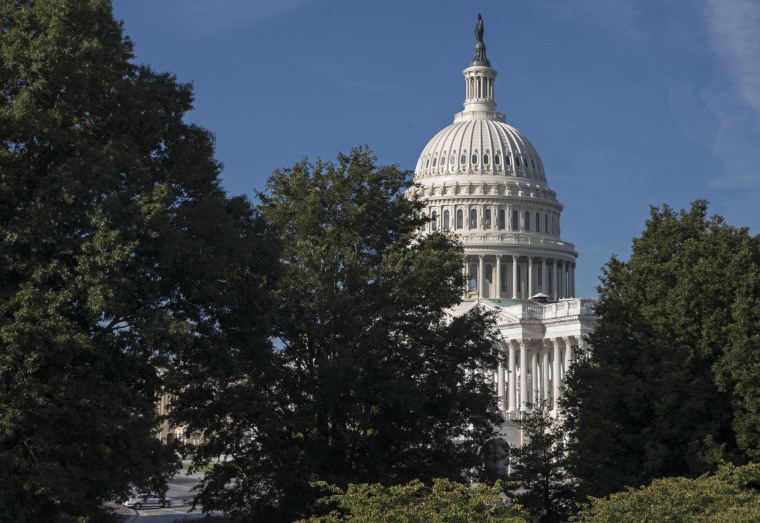WASHINGTON — Bipartisanship is suddenly the talk of Capitol Hill, where Republicans and Democrats are now expressing a tentative desire to join hands after a brutal debate over Obamacare repeal.
In the House, the "Problem Solvers" caucus, which consists of 43 members from both parties, put out a list of broad principles for a series of Obamacare tweaks.
"My hope is we can be responsible legislators and recognize we can take on those cost issues, we can take on the issue of health care, but let’s do it together," said Rep. Tom Reed, R-N.Y., who chairs the caucus, in an interview Tuesday.
The group’s Democratic co-chair, Rep. Josh Gottheimer, D-N.J., said members agreed to concentrate on addressing rising premiums and decreased participation in Obamacare’s exchanges. While there are signs the markets are stabilizing after major premium hikes last year, they’re still fragile and insurers say the ongoing uncertainty over repeal could create additional upheaval in 2018.
"Whoever’s to blame for it, we don’t have to get into now," Gottheimer told reporters in a conference call.
The group’s proposals include guaranteeing cost-sharing reduction payments to insurers, adding funding to help insurers cover expensive patients, partially repealing Obamacare’s requirement for businesses to offer health benefits, and scrapping the law’s tax on medical devices.
They also offered options to pay for the package, such as encouraging the use of generic drugs in Medicare. The cost could be a significant stumbling block to passage since it's likely the proposal would "significantly increase the deficit," according to Matthew Fiedler, a fellow at the Brookings Instutition.
In the Senate, Republican and Democratic leaders on the health committee announced in a joint statement that they would hold hearings early next month on how to calm Obamacare’s tumultuous insurance markets.

"In my opinion, any solution that Congress passes for a 2018 stabilization package would need to be small, bipartisan and balanced," said Sen. Lamar Alexander, R-Tenn., the committee’s chairman, in a statement.
In both cases in the House and Senate, Republicans pushed back against threats by President Donald Trump to halt payments insurers are owed for reducing out-of-pocket costs, a move that health experts warn would raise premiums. Trump has argued that allowing Obamacare’s exchanges to "implode" would put political pressure on Democrats to negotiate.
"I don’t agree with the president when he starts threatening withholding" the payments, Rep. Pat Costello, R-Penn., a member of the Problem Solvers caucus, said on MSNBC. "I mean that is extremely disruptive and would hurt American families."
Reed also warned that stopping the payments would have a negative effect and suggested that it wasn’t necessary to force a bipartisan agreement.
"We don’t have to create leverage or a ‘cliff’ type of effect that Washington over the last few years has been so fond of doing," he said.
Instead, a growing number of Republicans have proposed that Congress authorize the payments to insurers, known as cost-sharing reductions (CSR), on at least a temporary basis in order to provide insurance companies more certainty as they finalize their premiums for 2018 in September.
"Without payment of these cost-sharing reductions, Americans will be hurt," Alexander said.
He called on the White House to continue the status quo for the next two months and on the Senate to authorize them for another year after that.
A number of other Republicans have also indicated they’re unwilling to follow Trump’s lead and deliberately upend the insurance market if they can’t pass their own own health care bill.

"Until we can fix it, we can’t let the system collapse and, I think, if you don’t fund the CSR’s, the system will collapse," said Sen. John Kennedy, R-La.
While the outlines of a bipartisan bill are becoming easier to spot, it’s still not clear the new moves will produce actual legislation. The White House is weighing its options and Sens. Bill Cassidy, R-La. and Lindsey Graham, R-S.C., are pushing an alternate bill that would provide health care funding to states in the form of block grants.
House Speaker Paul Ryan has also indicated he’s not willing to give up on health care yet and conservative groups are expected to resist any deal that further entrenches Obamacare and makes it more difficult to repeal down the line.
"I don’t know how this Problem Solvers plan goes anywhere," one Republican House aide said, suggesting it was more of a messaging effort for its organizers than a viable plan.

